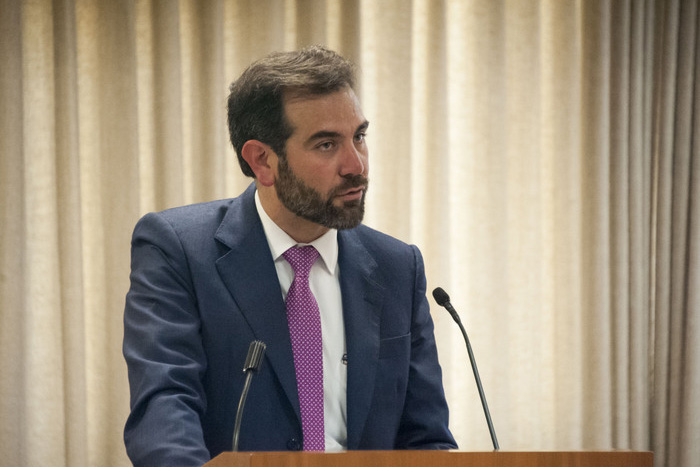Mexico’s President of the National Electoral Institute Speaks on the Issuing of Voting Cards to Mexican Citizens Living Abroad
Mexico’s President of the General Council of the National Electoral Institute (INE), Lorenzo Cordova, gave a guest lecture earlier this month to California State University, Northridge students, faculty and staff, focused on the evolution of Mexico’s electoral system and the process and delivery of voting cards to Mexican citizens living abroad.
The electoral institute is responsible for organizing federal elections in Mexico. Cordova, INE’s first-ever elected president, is the author of several books, articles and essays on constitutional law, elections and political theory. The lecture was sponsored by CSUN’s College of Social and Behavioral Sciences, the Department of Political Science and Universidad Nacional Autónoma de México (UNAM) – Los Angeles.
As of Feb. 8, Mexican citizens living in the United States have the opportunity to apply for a voting card. Although Mexican citizens living abroad have been able to vote in Mexico elections since 2005, it’s been increasingly difficult because voting cards could only be obtained in Mexico.
“This is the first time these cards will be issued outside of the country,” Cordova said. “The chance for citizens to receive a voting card should greatly increase the amount of participation we see at the upcoming election.”
Mexicans living outside the country can receive a voting card at one of the 16 consular offices set up across the United States. Offices in California include Los Angeles, San Francisco, Sacramento, Santa Ana and San Jose. Mexican citizens living abroad who would like to vote in the 2018 election will have to apply for the voting card at one of these consular offices.
Voting cards, which have been distributed to citizens living in Mexico since the 1990s, originally were given out in an effort to properly identify voters and crack down on voter fraud.
The 2015 federal election in Mexico, according to Cordova, was the largest organized election in the country’s history.
“Never before have we had such a high number of registered voters,” Cordova said. “83.5 million citizens were registered to vote, which meant 148,633 voting stations had to be installed — 6,000 more than the presidential election in 2012.”
Cordova said he hopes these numbers will grow even more in 2018 by granting Mexican citizens across the world easier access to vote.
“Voting cards will surely favor Mexicans living abroad,” Cordova said. “These cards go beyond the electoral arena and enhance the fundamental rights of Mexicans regardless where they live.”


 experience
experience